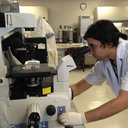Anticancer Effects of γ-Tocotrienol Are Associated with a Suppression in Aerobic Glycolysis.
Ključne besede
Povzetek
Aerobic glycolysis is an established hallmark of cancer. Neoplastic cells display increased glucose consumption and a corresponding increase in lactate production compared to the normal cells. Aerobic glycolysis is regulated by the phosphatidylinositol-3-kinase (PI3K)/Akt/ mammalian target of rapamycin (mTOR) signaling pathway, as well as by oncogenic transcription factors such as c-Myc and hypoxia inducible factor 1α (HIF-1α). γ-Tocotrienol is a natural isoform within the vitamin E family of compounds that displays potent antiproliferative and apoptotic activity against a wide range of cancer cell types at treatment doses that have little or no effect on normal cell viability. Studies were conducted to determine the effects of γ-tocotrienol on aerobic glycolysis in mouse +SA and human MCF-7 breast cancer cells. Treatment with γ-tocotrienol resulted in a dose-responsive inhibition of both +SA and MCF-7 mammary tumor cell growth, and induced a relatively large reduction in glucose utilization, intracellular ATP production and extracellular lactate excretion. These effects were also associated with a large decrease in enzyme expression levels involved in regulating aerobic glycolysis, including hexokinase-II, phosphofructokinase, pyruvate kinase M2, and lactate dehydrogenase A. γ-Tocotrienol treatment was also associated with a corresponding reduction in the levels of phosphorylated (active) Akt, phosphorylated (active) mTOR, and c-Myc, but not HIF-1α or glucose transporter 1 (GLUT-1). In summary, these findings demonstrate that the antiproliferative effects of γ-tocotrienol are mediated, at least in the part, by the concurrent inhibition of Akt/mTOR signaling, c-Myc expression and aerobic glycolysis.


